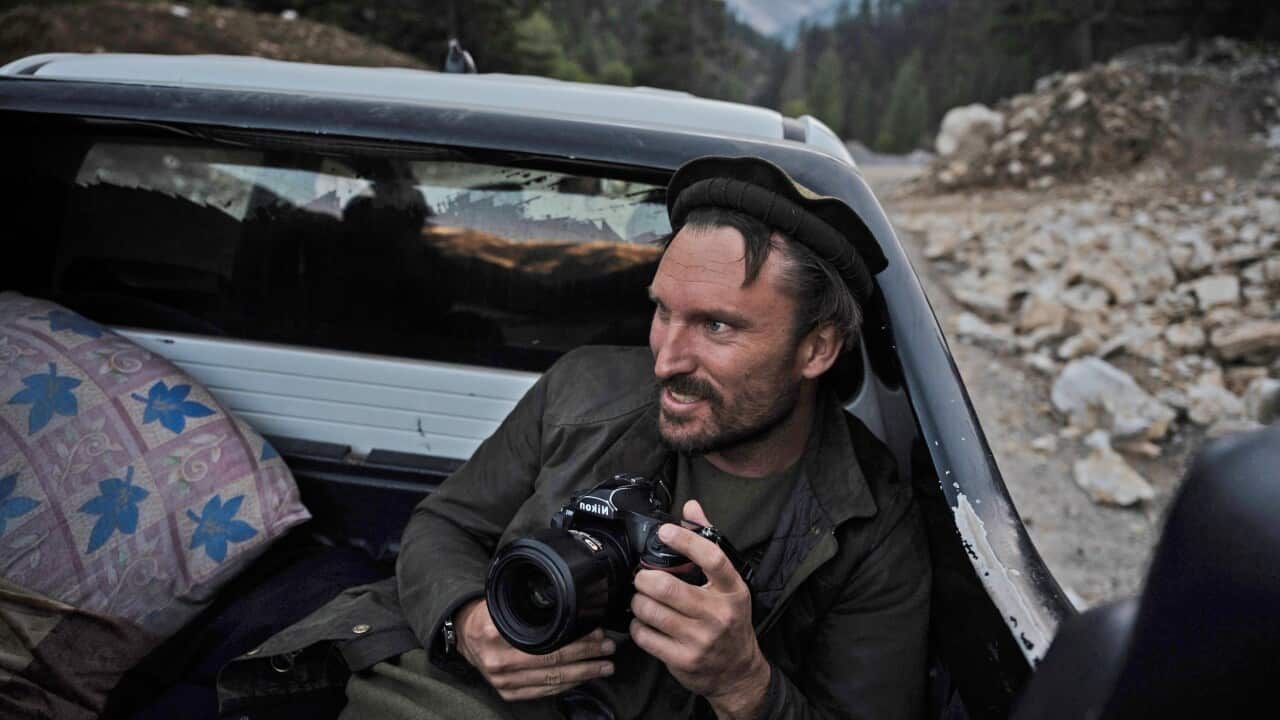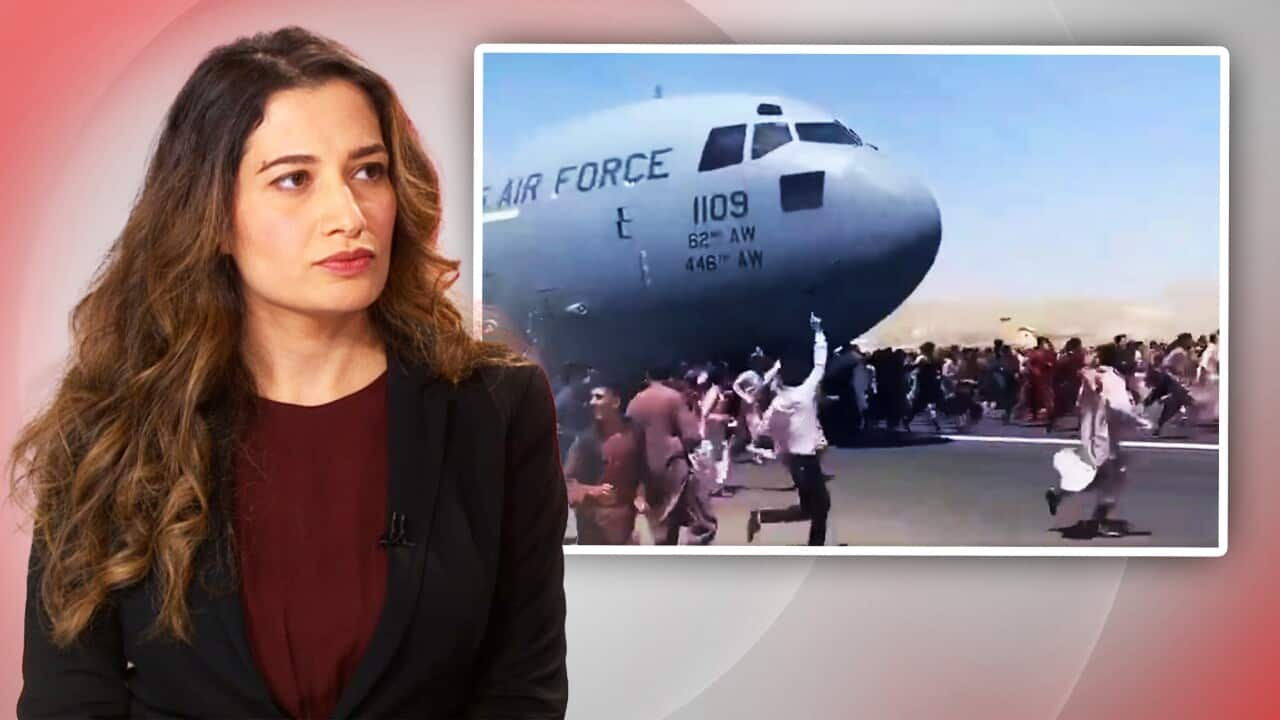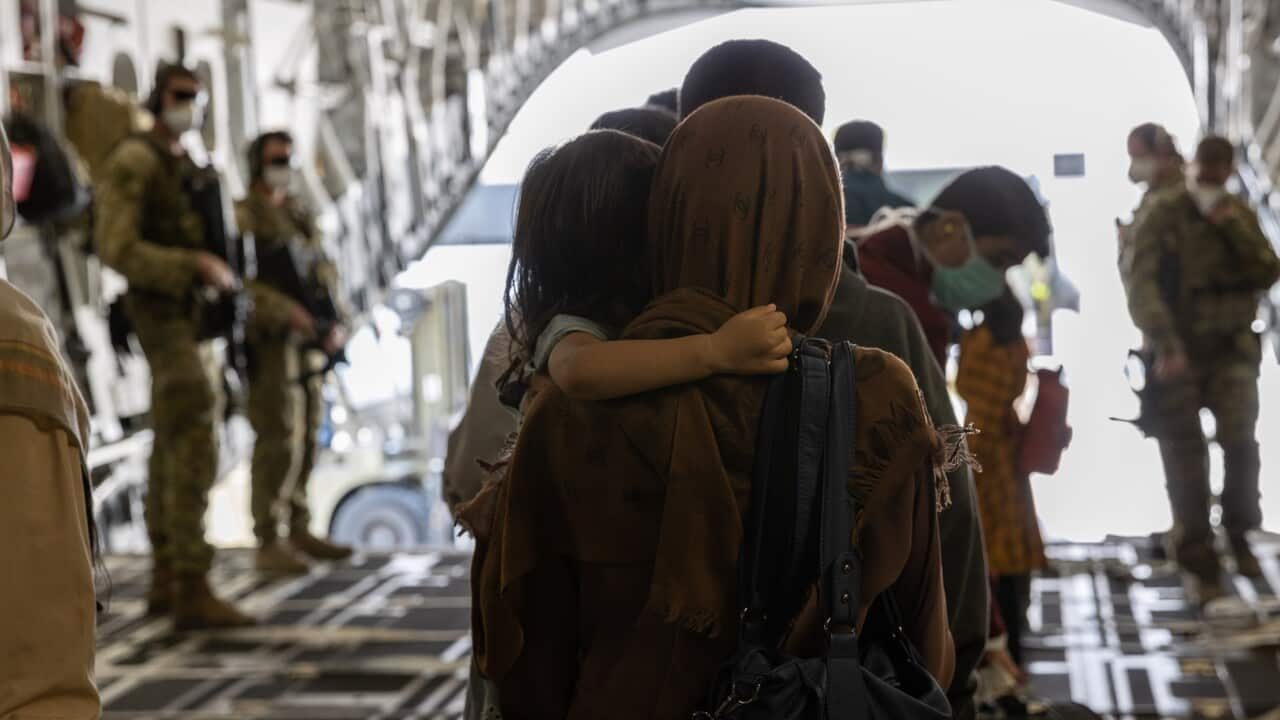

10 min read
This article is more than 2 years old
'I had to consider whether I should be there or not': photographing people on the 'worst day of their lives'
Australian photographer, journalist and now author, Andrew Quilty, documented the Taliban takeover. Having lived and worked in Afghanistan for almost a decade, he often had to navigate the ethical minefield which comes with reporting on conflict.
Published 1 September 2022 5:41am
By Jennifer Scherer
Source: SBS
Image: Andrew Quilty holding his camera in Afghanistan. (Nanna Muus Steffensen.)
It was a late night in August 2021 when Andrew Quilty wove through desperate crowds at Kabul Airport. The Taliban had just claimed the city and the streets leading to the departure gate were congested with tens of thousands of people who wanted to flee the country.
Known widely in Kabul as the motorbike-riding Australian photojournalist who was often first at a scene - be it a bomb blast or a watercolour sunset - a situation like this would usually call for Quilty to have his finger pressed hard against the shutter button of his camera.
But this night, his gaze was focused squarely on trying to help those around him.

Taliban fighters, ride atop an American-made armoured Humvee through the streets of western Kabul while being cheered on by local residents and passers-by. 15 August 2021. Credit: Andrew Quilty
“One [involved] a single guy who had an Australian visa, but by the time we got to the airport the Australians had left.
“He is still in Afghanistan now.”
It’s moments like these that Quilty describes as “heartbreaking” and it’s this emotion that he conveyed to the world through his photography as Kabul fell.
One of the only Western journalists who stayed in Kabul as the Taliban entered the city, Quilty says taking photos of people, some of whom were experiencing the “worst day of their lives,” made him grapple with his own moral compass.
“I guess with photography, it's a matter of finding the line between your work as a photographer and your moral obligations as a human being,” he says.
“It's maintaining a level of humanity.”
A decade in Afghanistan
When the Taliban takeover of Afghanistan gathered momentum after the US exit in 2021, Quilty was attending a wedding in France. He’d spent almost a decade in Afghanistan and was “getting weary of the place and the pessimistic outlook”.
But as it became inevitable to him that the Taliban would take Kabul, he says he couldn’t stay away. In his newly released book, ‘August in Kabul’, Quilty describes an eerie scene of boarding a plane back to Afghanistan’s capital, a quiet, everyday flight back to a city many were trying to escape.
“I wanted to be there as a journalist, but I also just felt like I had to be there with my people.
“My foreign friends, my housemates, my dog, my colleagues, but also, in particular, my Afghan friends and colleagues.
“I thought, if I stay out and watch this happen from afar, it’d feel like abandonment or dishonourable.”

At sunrise in the Kabul neighbourhood of Kart-e-Say, people queue outside Afghanistan's only passport office as the Taliban's military advance gathered momentum. 12 July 2021. Credit: Andrew Quilty
“It was very tense. I was really nervous, scared about what was to come. We didn’t know how it was going to play out.”
Kabul's Hamid Karzai International Airport would become the centre of a chaotic exodus as thousands of people spilled onto the tarmac, some desperately clinging to the sides of planes during take-off. A crowd crush would kill at least 7 Afghans waiting to board evacuation flights.
In late August, a suicide bomber killed at least 170 civilians and 13 US troops outside the airport's Abbey Gate. The so-called Islamic State group - known as Islamic State Khorasan (ISIS-K) - claimed responsibility for the attack.
The Taliban promised it would exercise a more lenient rule than their first term in power in the 1990s but since then there has been an erosion of women's rights.
According to the UNHCR, by the end of 2021 more than six million Afghans were forced to flee their homes. 3.5 million were displaced within Afghanistan.
Quilty says in the days following the Taliban takeover he “wasn’t a very good journalist”.
“[I was] trying to document it a little bit … priorities were more about managing the days.”
He had been living in a sharehouse with other correspondents and his dog, Mushu.
“I had to consider whether I should be there or not, there were a lot of people saying I should get to the airport.
“But I had to work out what to do not only with myself, but with others that I felt a level of responsibility for.”
This level of responsibility came from having created a strong bond with the country and the people in it. Quilty had lived and worked in Afghanistan for almost a decade.

Andrew Quilty in Afghanistan. Credit: Nanna Muus Steffensen
Their identity has been protected for safety reasons.
“He learnt the culture of Afghans which is very important, he learnt the proverb, when in Rome do as the Romans do,” they tell SBS Dateline.
“He was like an Afghan and that is why he never published any pictures to destroy our reputation.
“He published our happiness, and he published our sadness and that was very important to us because the world paid attention.”
Quilty’s affinity with Afghanistan is best summed up by his former colleague.
“A few years ago I asked Andrew, ‘Why are you in Kabul?’ The situation wasn’t very safe and I asked why he wouldn’t want to go home to [Australia] to have a good life.
“He said ‘No, I like to be in my own house with my dog in Kabul’ and I was astonished - if Andrew likes to be in Kabul why are we trying to leave our own country?
“At that time there were threats on me … and I had a plan to leave but he gave me confidence.”
He published our happiness, and he published our sadness and that was very important to us because the world paid attentionAn Afghan journalist who worked with Quilty
While Quilty left Afghanistan last November to start writing his book about the Taliban takeover, it’s clear a part of him will always reside in Kabul.
“People [in Afghanistan] will not forget him, they respect him because of the history that he recorded.
“He was putting the lives of people on the wall. He was an asset to Afghanistan.”

With the Taliban surrounding Kabul, US military helicopters evacuate American diplomats from the country's embassy to the Hamid Karzai International Airport. 15 August 2021. Credit: Andrew Quilty
The ethical minefield of war reporting
While he initially travelled to Afghanistan to accompany a journalist friend and take photographs for her story, over time, he increasingly started accompanying his images with his own writing.
In 2016, he won a prize in Australia’s major journalism awards: the Walkley Photo of the Year for his photograph titled ‘The Man on the Operating Table.’ The image shows the body of Baynazar Mohammed Nazar, an Afghan civilian who was killed after a US airstrike hit a Médecins Sans Frontières hospital. After discovering the man’s identity, Quilty would travel to meet Baynazar’s family and create a body of work which would honour his life and his family’s grief. The work would collect Quilty a slew of awards, including the Gold Walkley that year.
“A powerful photograph or a powerful story often relies on being with people on the worst day of their lives,” Quilty says.
“Obviously, I’m very conflicted about it but I still do it, and I think you can do it in a way that’s morally conscionable and respectful.
“I’ve watched other people do it in a way that I would consider disrespectful and it makes me conscious of doing it in a way that I can still sleep at night.”
A powerful photograph or a powerful story often relies on being with people on the worst day of their lives.Andrew Quilty
This expression of moral inquiry is a process the International Committee of the Red Cross - who run workshops on ethical reporting of conflict - encourages.
“It's really about having as much information as you can to understand the context so you're not accidentally walking into a scenario where you might cause harm … or distress for the people that you're working with, around the stories that you're developing,” Anita Dullard from the International Committee of the Red Cross told SBS Dateline.
“It's absolutely critical that we have the media telling the stories of people affected by conflict and also the broader context of these situations. When conflict or other crises go on for a long time, they get forgotten but the day-to-day realities of what people are surviving is so real.
“Part of the reason why it's a problem if these stories aren't told is that funding doesn't reach people who need it the most.”
This year, Quilty won the Walkley Foundation’s Humanitarian Storytelling Award. The award is supported by the International Committee of the Red Cross.

Hundreds of people camped in a dusty field adjacent to the northwestern gate to Hamid Karzai International Airport, Kabul as a U.S. military C-17 transport aircraft takes off in the background. They are among the tens of thousands who have attempted to gain entry to the airport. 24 August 2021. Credit: Andrew Quilty
Finding a 'new meaning' in Afghanistan
Quilty’s photography career began in 2000, after he was rejected from a university photo elective. It was this moment that encouraged him to quit and travel around Australia, armed with his surfboard and a Nikon F3 camera handed down by an uncle.
He would go on to quickly make a name for himself, his talent and eye for capturing a fleeting moment rewarded through winning his first World Press Photo award in 2008. From there, his repertoire of award-winning photojournalism has only continued.
When looking through some of Quilty’s albums online, it’s clear the award-winning photographer was charmed by Afghanistan from the moment he arrived in 2013.
Taking photographs of everyday life, as well as scenes of horror and bitter sadness, his work conveys a delicate sense of concern for the future of the people who were the subject of his photographs.
“I found a new meaning in my work, in photography,” he says.
“The photos or the scenes that I could photograph there, had a depth … that I hadn't experienced before. I found a real sense of purpose.”
While his work has earned many accolades, an allegation of ‘inappropriate behaviour’ in 2019 resulted in the World Press Photo Foundation cancelling his invitation to its awards ceremony in that year, for which he was a finalist.
It was a decision that saw Quilty dropped by several leading publications and had what Quilty describes as a “profound” impact on his career. He says he is still trying to meet with the World Press Photo Foundation to find out more about its decision as he doesn’t know anything about the nature of the allegations.
A year after the Taliban took over Afghanistan, Quilty has released his book ‘August in Kabul.’ It combines a collection of stories from eyewitnesses who had, like him, a front row seat to history.
“I hope it enables people to connect to people they otherwise wouldn’t have been able to and to personalise this huge event that most people were aware of at the time, watching the news, hearing about hundreds of thousands of people at the airport,” he says.
“[This book] humanises people from various points of view who went through it - who lived and died through it.”
The lead image of Andrew Quilty holding his camera in Afghanistan was taken by Nanna Muus Steffensen.



